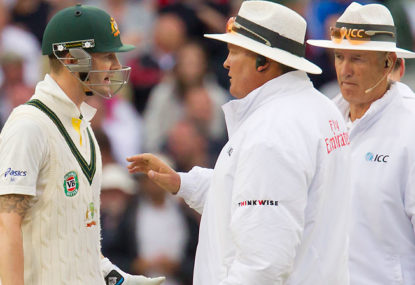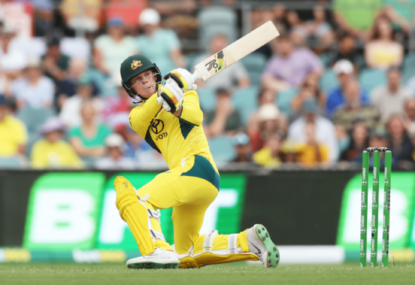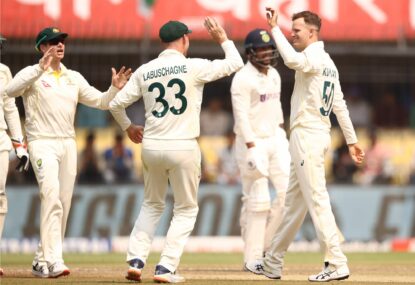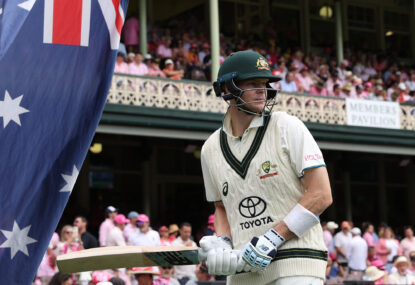Michael Clarke is seemingly venturing towards his 100th Test in a manner that Australian fans have long predicted.
Sitting on 97 tests – ironically the same amount as his opposite equal Alastair Cook – he has recently set the world alight with a proactive captaincy style rarely witnessed in the modern era.
Taking over the side after Australia’s home Ashes in 2010/11, Clarke has now led Australia in nine Test series, faring extremely well in most.
His recent series, however, showed a side of Clarke not witnessed since his breakout innings against South Africa 25 tests ago. That 151, scored in difficult conditions at Newlands, was the moment that Clarke officially added the mantle of ‘Australia’s best batsman’ to the captaincy.
It’s no coincidence that the innings occurred when everyone else around him failed, for in recent times he has not only become his side’s saviour, but the liberator of a nation as demanding of success as the sun.
Michael Clarke is a natural aggressor. It seems almost natural for people to think of him in that sense today, yet the ‘pretty boy’, who was often criticised for his appearance rather than performance, had to provide a Bradmanesque period in order to change that.
Those days are what prepared him for this period. A period where he took over the captaincy and became the best batsman in the world.
A period where, ironically, he became a nation’s only hope, as he fought not just for personal success but that of ‘his’ team.
He started in a manner that defied belief, breaking records. He led from the front in terms of runs scored on the scorecard, but consistently from behind in the order.
It left many to ponder why he didn’t move up the order, transitioning from a position that became less essential as a consequence of his teammates’ failures to one of constant significance.
Yet Clarke felt quietly confident there. In an era of Australian dominance that is now nothing but a sweet nostalgic memory, he was firmed and allowed to grow into a role that presented an easier, if not enticing, prospect of entry into international cricket as his career was built.
He’s now become accustomed to it in many senses, a batsman so ‘set’ to certain standards that a shift in procedure has done nothing but ‘throw him’.
After all, his demeanour coming in at number four in the 10th over is one of much more reluctance that that of his arrival in the 10th at number five.
It’s that mental presence, or hindrance, that haunted Clarke throughout the Ashes.
While his counterpart Cook quite simply lost form, leaving a statistical trail of decline since last year, Clarke was building form solidly before the start of the series.
In conditions that would suit Clarke as much as any batsmen in the series, he failed to capture the big moments as he so often has over the past two years. This could be due to the bowling of Stuart Broad, or due to the arrival of an inevitable ‘deterrent’ in terms of his mental capacity.
The bowling of Broad to Clarke was one of the highlights of the series, further infuriating the groups back home that found despising Broad a worthwhile pastime.
Remember, this was a batsman who took on the world’s best bowler, Dale Steyn, just eight months earlier on hard and fast pitches and averaged 144 for the series.
The man who scoffed at claims his first double century was a fluke by scoring another one the very next innings against arguably the best pace attack in the world.
Not once did he look troubled against the pace back home against the South Africans. The only way to get rid of him was through one of the balls of the year in the Third Test.
The South African series was, however, significant in other aspects. There was a look of despair in Clarke’s actions after the Third Test, which they lost after two draws.
His was a Herculean effort during the series, yet the team still ended up on the wrong side of the scoreline. It was perhaps right there that Clarke realised that no matter what he did, orhow much he scored, it was going to take much more than personal success to find not only team success, but unity.
I’m sure Clarke is not naïve enough to believe he could personally win a Test or series alone, but I’m sure immediately after that series he realised the gulf between personal success and team victory was larger than first thought.
Since then he has averaged 79 against Sri Lanka and 47 in India. Although representing solid form, such results are expected of a man with his class in his form.
It did allow glimpses of Clarke’s new persona that led to, at times, a compromising of his philosophy of hard-work and perseverance, jeopardising his unsatisfiable hunger for runs by allowing himself to unusually meander through his innings.
Which brought Clarke to England, where he averaged 47. Take away the redundant 187 he scored in the rained out Third Test, however, and it matches his opposite Cook’s 27.
You’d get a similar result subtracting Root, Watson and Smith’s centuries, but I highlight this only because it was the one innings Clarke played ‘his’ game, followed his values.
Most other innings he looked as lost as the rest of his team – a batting sextet searching for a spot, a ‘niche’, which Clarke has previously possessed before his move up the order.
This, mixed with a number of well documented off-field issues, a changing of coach and a debilitating back injury has exhausted Clarke.
The man who was perfect for the conditions he was presented with, the man expected to rise to the big occasions, the man expected to be Australia’s main batsmen in this Ashes has struggled.
Australia came together to break the England captain, the man that stole the last Ashes from their grasp.
Ironically, somewhere in the process they broke their own.





































































































